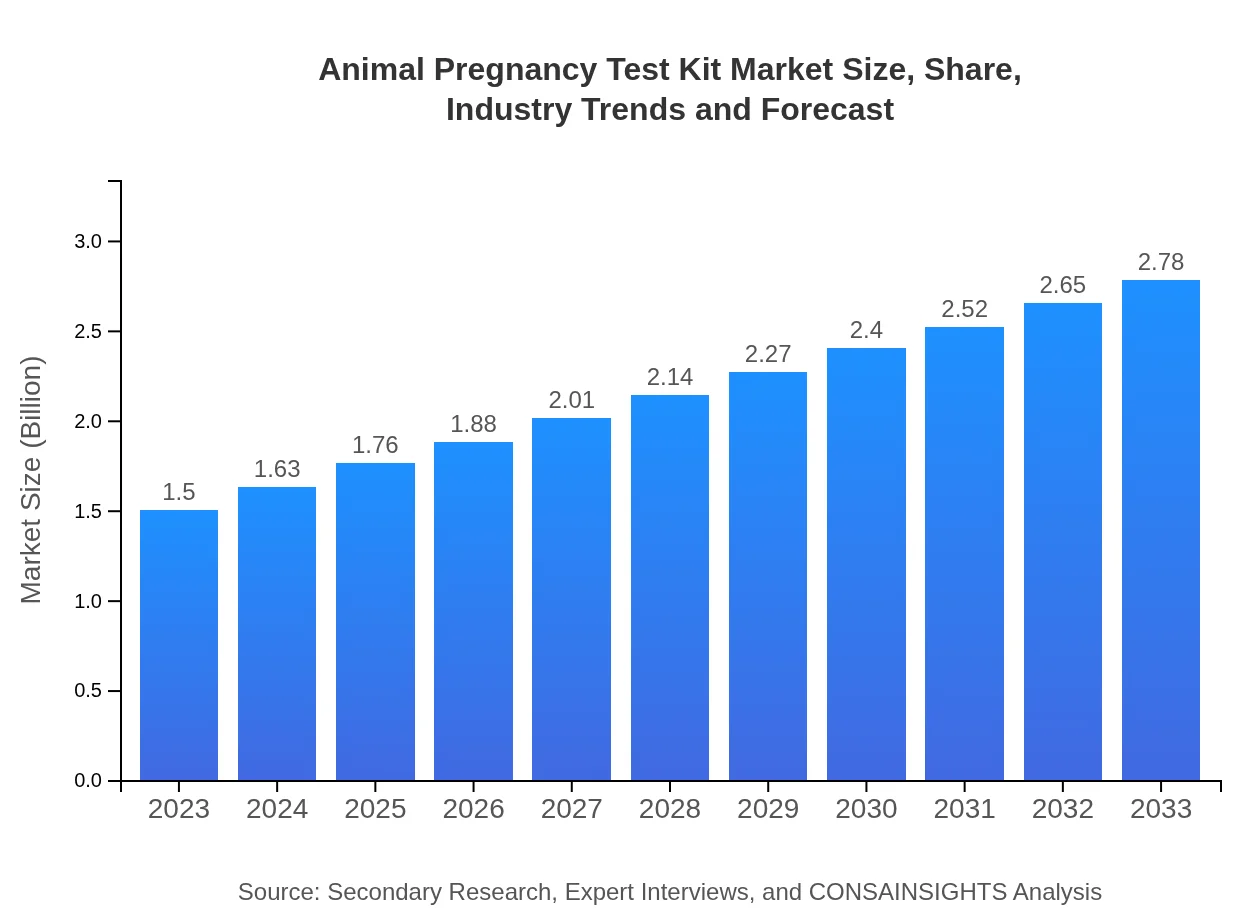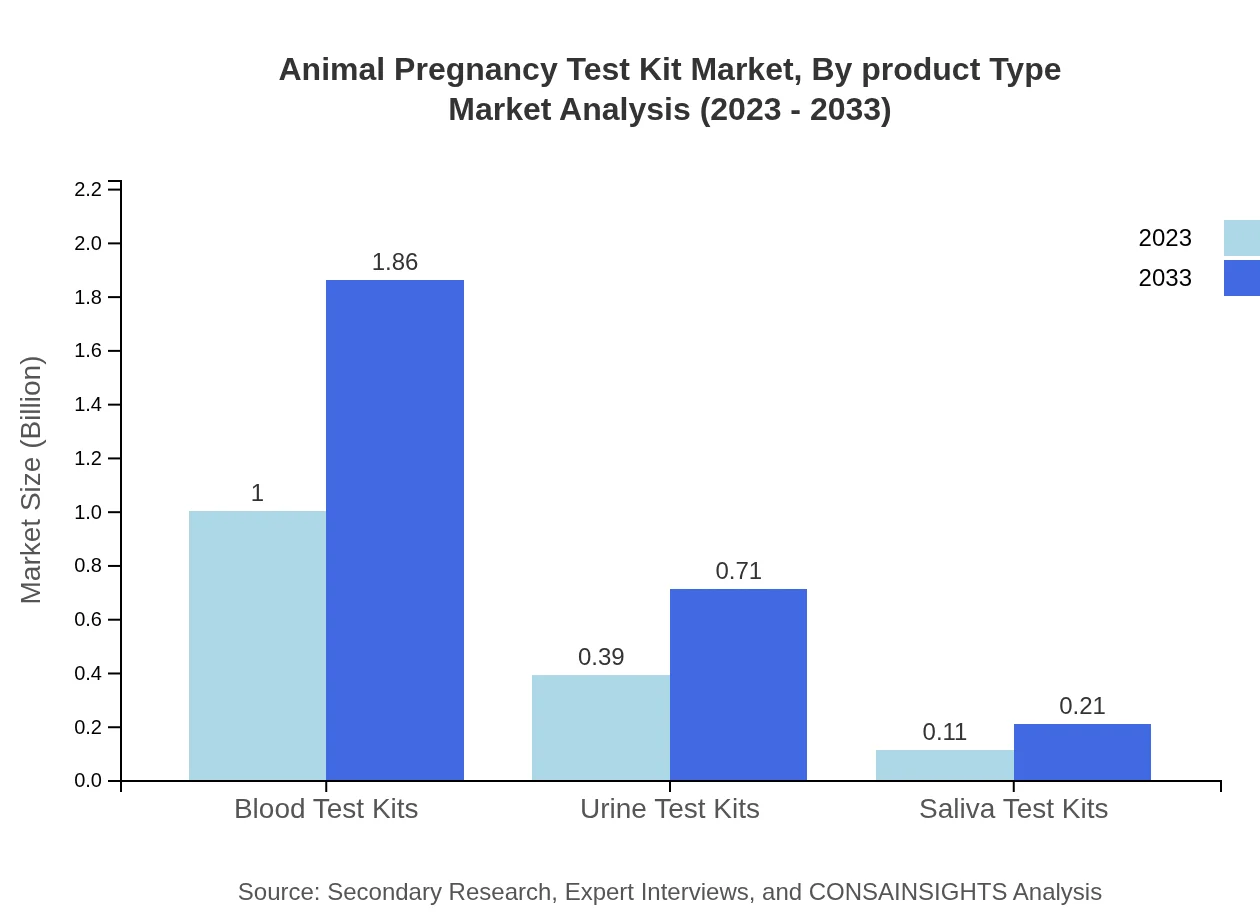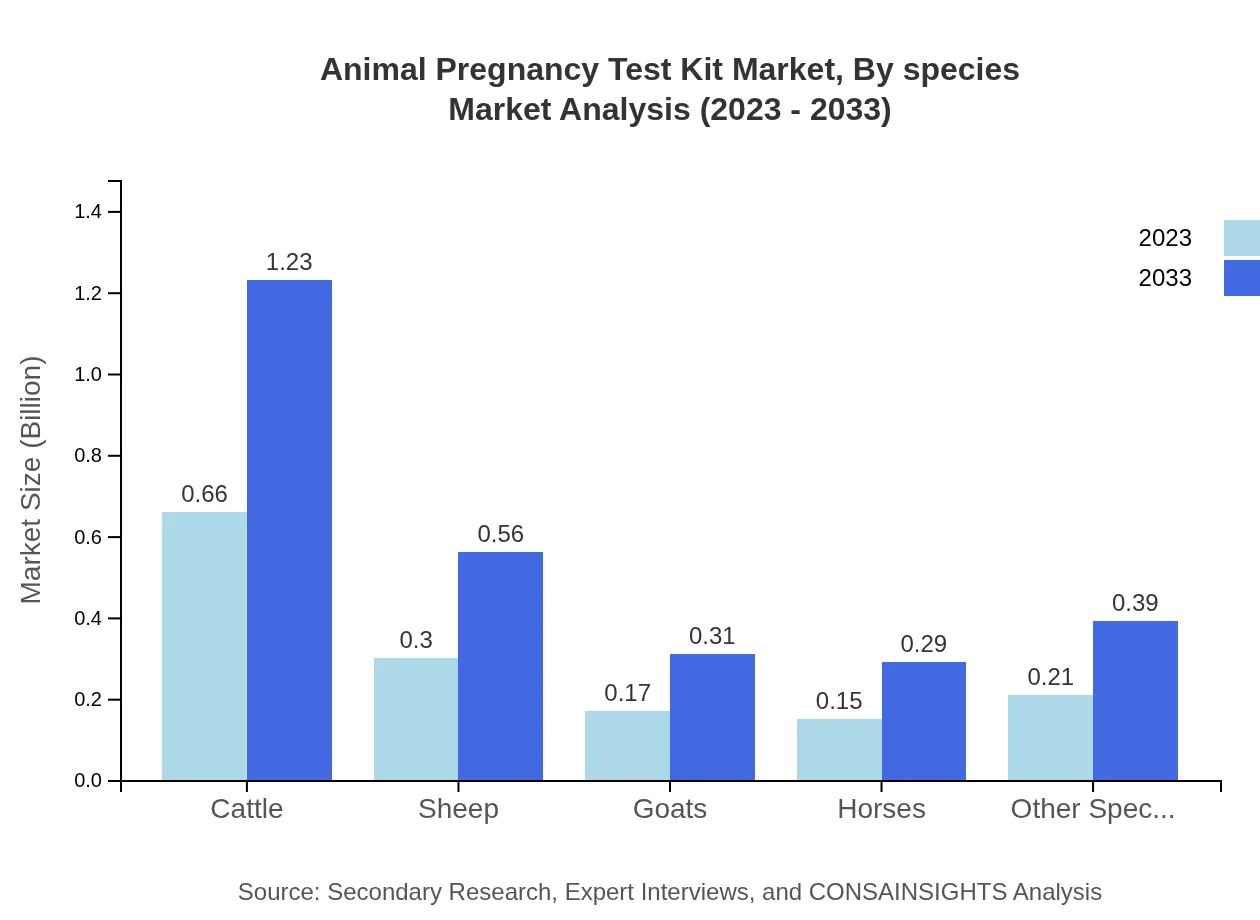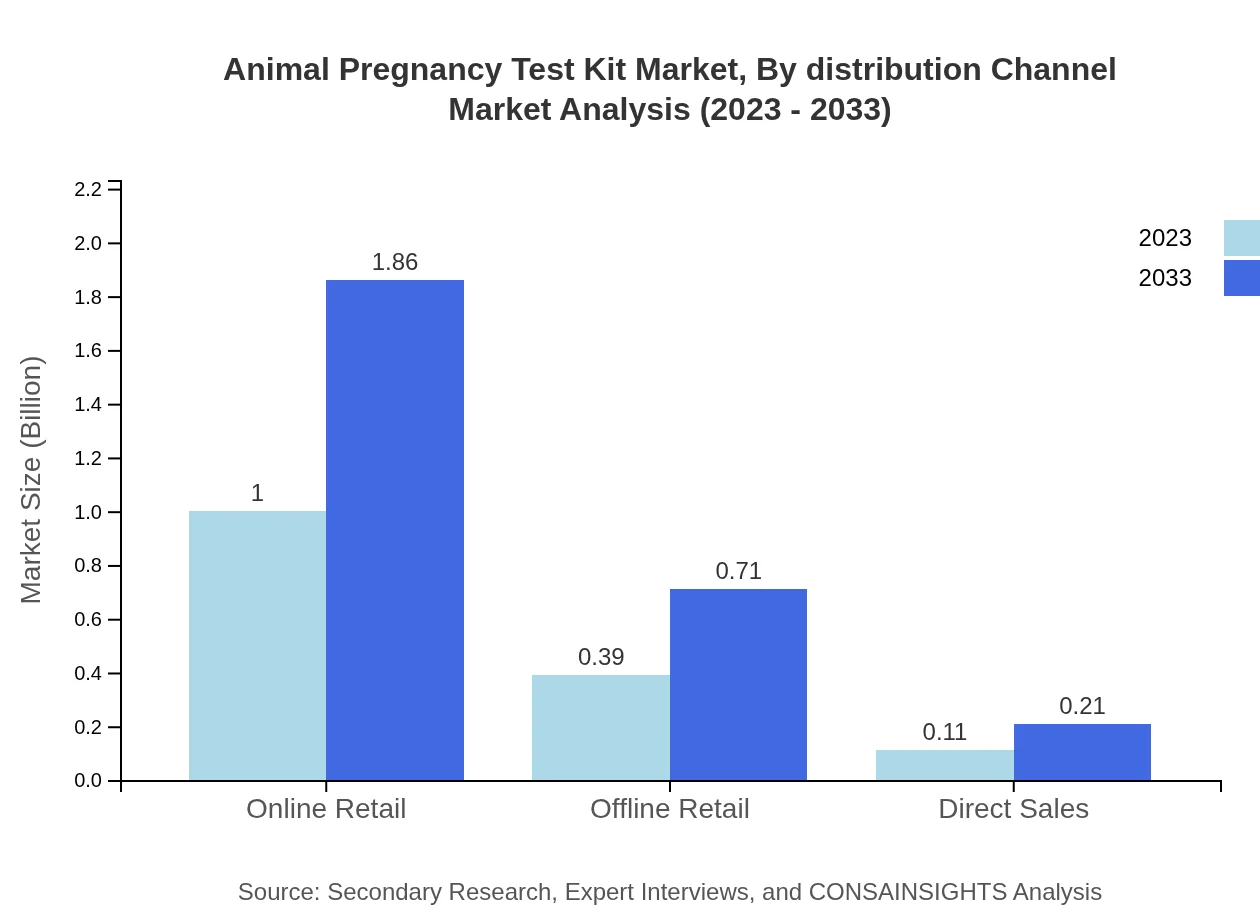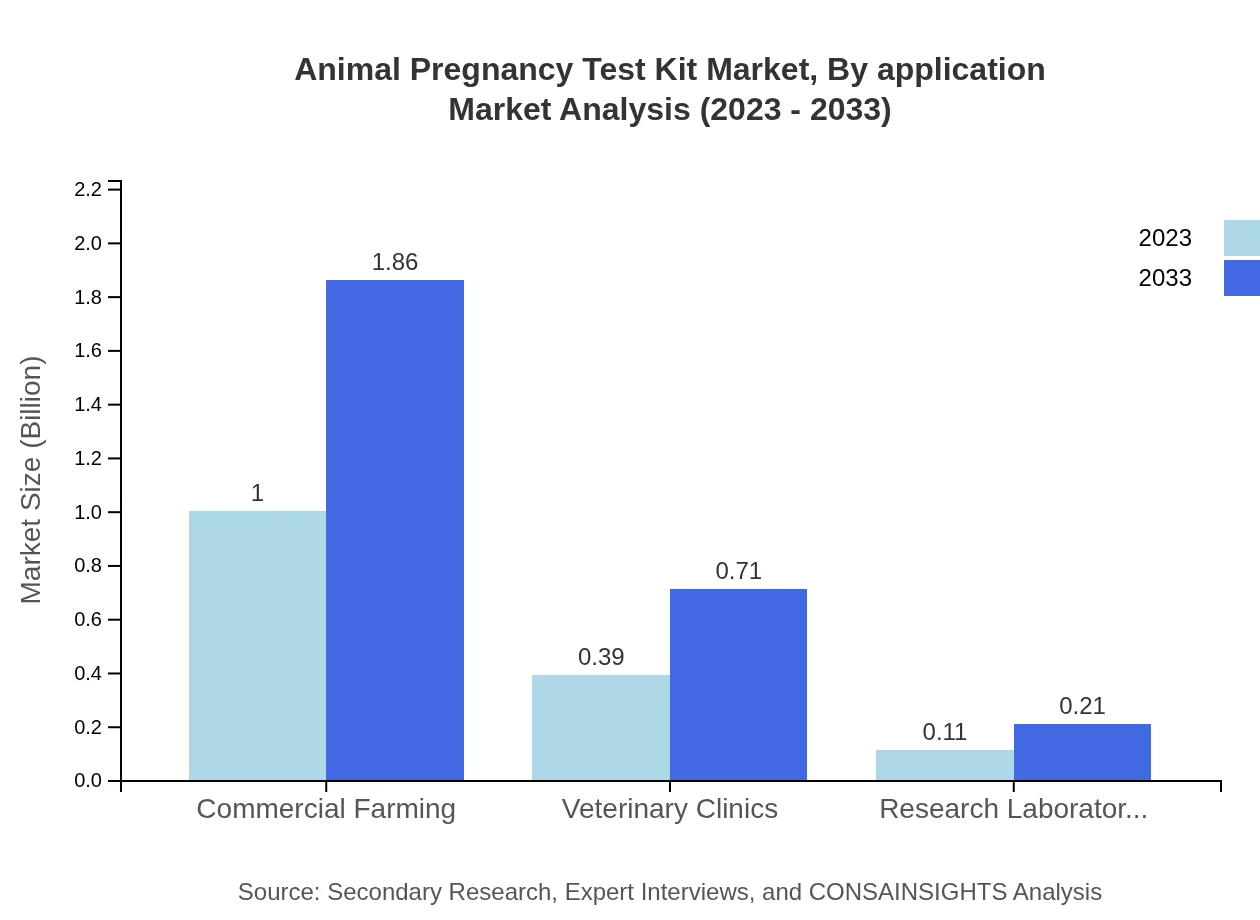Animal Pregnancy Test Kit Market Report
Published Date: 31 January 2026 | Report Code: animal-pregnancy-test-kit
Animal Pregnancy Test Kit Market Size, Share, Industry Trends and Forecast to 2033
This report provides a comprehensive analysis of the Animal Pregnancy Test Kit market from 2023 to 2033, exploring key trends, growth factors, market size, and competitive landscape, to present insights that guide stakeholders and investors.
| Metric | Value |
|---|---|
| Study Period | 2023 - 2033 |
| 2023 Market Size | $1.50 Billion |
| CAGR (2023-2033) | 6.2% |
| 2033 Market Size | $2.78 Billion |
| Top Companies | Zoetis, Idexx Laboratories, Neogen Corporation, Vetoquinol |
| Last Modified Date | 31 January 2026 |
Animal Pregnancy Test Kit Market Overview
Customize Animal Pregnancy Test Kit Market Report market research report
- ✔ Get in-depth analysis of Animal Pregnancy Test Kit market size, growth, and forecasts.
- ✔ Understand Animal Pregnancy Test Kit's regional dynamics and industry-specific trends.
- ✔ Identify potential applications, end-user demand, and growth segments in Animal Pregnancy Test Kit
What is the Market Size & CAGR of Animal Pregnancy Test Kit market in 2023?
Animal Pregnancy Test Kit Industry Analysis
Animal Pregnancy Test Kit Market Segmentation and Scope
Tell us your focus area and get a customized research report.
Animal Pregnancy Test Kit Market Analysis Report by Region
Europe Animal Pregnancy Test Kit Market Report:
Europe is experiencing a substantial increase in the Animal Pregnancy Test Kit market, with an expected rise from USD 0.49 billion in 2023 to USD 0.90 billion by 2033, attributed to stringent animal health regulations and growing awareness among farmers.Asia Pacific Animal Pregnancy Test Kit Market Report:
In the Asia-Pacific region, the market was valued at USD 0.26 billion in 2023 and is expected to grow to USD 0.49 billion by 2033, driven by increasing livestock farming and technological advancements in veterinary care.North America Animal Pregnancy Test Kit Market Report:
North America's market is anticipated to surge significantly from USD 0.54 billion in 2023 to USD 1.00 billion by 2033. High adoption rates of innovative veterinary products and a strong emphasis on livestock health contribute to this rapid growth.South America Animal Pregnancy Test Kit Market Report:
The South American market, although smaller, is projected to grow from USD 0.02 billion in 2023 to USD 0.05 billion by 2033 as agricultural investments in the region increase and livestock farming becomes more prevalent.Middle East & Africa Animal Pregnancy Test Kit Market Report:
The Middle East and Africa’s market will expand from USD 0.18 billion in 2023 to USD 0.34 billion by 2033, driven by initiatives aimed at improving livestock productivity and welfare amidst rising food security concerns in the region.Tell us your focus area and get a customized research report.
Animal Pregnancy Test Kit Market Analysis By Product Type
Blood test kits dominate the market, valued at USD 1.00 billion in 2023 and projected to reach USD 1.86 billion by 2033, accounting for a significant share of 66.91%. Urine test kits follow, with a value of USD 0.39 billion expected to grow to USD 0.71 billion by 2033, representing a share of 25.7%. Saliva test kits are minimal yet growing, with projections of USD 0.11 billion to USD 0.21 billion.
Animal Pregnancy Test Kit Market Analysis By Species
Cattle form the largest segment with a market size of USD 0.66 billion in 2023, expected to reach USD 1.23 billion by 2033 and maintaining a constant share of 44.22%. Sheep show promising growth, with values from USD 0.30 billion to USD 0.56 billion, and goats from USD 0.17 billion to USD 0.31 billion. Horses and other species have performance growth as well.
Animal Pregnancy Test Kit Market Analysis By Distribution Channel
Online retail channels lead with a market size of USD 1.00 billion in 2023 projected to hike to USD 1.86 billion, holding 66.91% market share. Offline retail channels follow with sizes from USD 0.39 billion to USD 0.71 billion, while direct sales remain a niche with moving figures from USD 0.11 billion to USD 0.21 billion.
Animal Pregnancy Test Kit Market Analysis By Application
Commercial farming captures a massive share of the market with an anticipated growth from USD 1.00 billion to USD 1.86 billion. Veterinary clinics keep a solid footing from USD 0.39 billion to USD 0.71 billion, while research laboratories add their contributions from USD 0.11 billion to USD 0.21 billion.
Animal Pregnancy Test Kit Market Trends and Future Forecast
Tell us your focus area and get a customized research report.
Global Market Leaders and Top Companies in Animal Pregnancy Test Kit Industry
Zoetis:
A global leader in animal health, providing a wide range of tests for livestock, including pregnancy detection kits.Idexx Laboratories:
Provides innovative diagnostic products and services for animal pregnancy testing, known for high accuracy and reliability.Neogen Corporation:
Offers a robust line of veterinary diagnostic solutions including pregnancy test kits tailored for various animal species.Vetoquinol:
Specializes in developing animal care products, including testing kits that help in pregnancy diagnosis among livestock.We're grateful to work with incredible clients.









FAQs
What is the market size of animal pregnancy test kits?
The animal pregnancy test kit market is projected to reach $1.5 billion by 2033, growing at a CAGR of 6.2%. This growth is driven by rising demands for efficient animal reproduction management across various types of livestock.
What are the key market players or companies in the animal pregnancy test kit industry?
Key players in the animal pregnancy test kit industry include major veterinary companies, agricultural biotechnology firms, and diagnostics providers focusing on animal health solutions. Their innovation strategies significantly contribute to market dynamics.
What are the primary factors driving the growth in the animal pregnancy test kit industry?
Growth in this industry is driven by increasing livestock farming practices, technological advancements in veterinary diagnostics, and growing consumer demand for effective reproductive performance in commercial farming and breeding.
Which region is the fastest Growing in the animal pregnancy test kit market?
North America is the fastest-growing region, expected to grow from $0.54 billion in 2023 to $1.00 billion by 2033. This growth is supported by advancements in veterinary practices and increasing adoption of animal husbandry techniques.
Does ConsaInsights provide customized market report data for the animal pregnancy test kit industry?
Yes, ConsaInsights offers customized market report data tailored to specific needs within the animal pregnancy test kit industry, ensuring clients receive the most relevant insights for strategic decision-making.
What deliverables can I expect from this animal pregnancy test kit market research project?
Deliverables include comprehensive market analysis, segmentation data, trend insights, regional forecasts, competitive landscape evaluation, and strategic recommendations tailored to enhance market positioning.
What are the market trends of animal pregnancy test kits?
Key trends include growing investment in livestock health management, increased use of digital platforms for testing sales, and a shift towards non-invasive testing methods, highlighting innovation in veterinary diagnostics.

